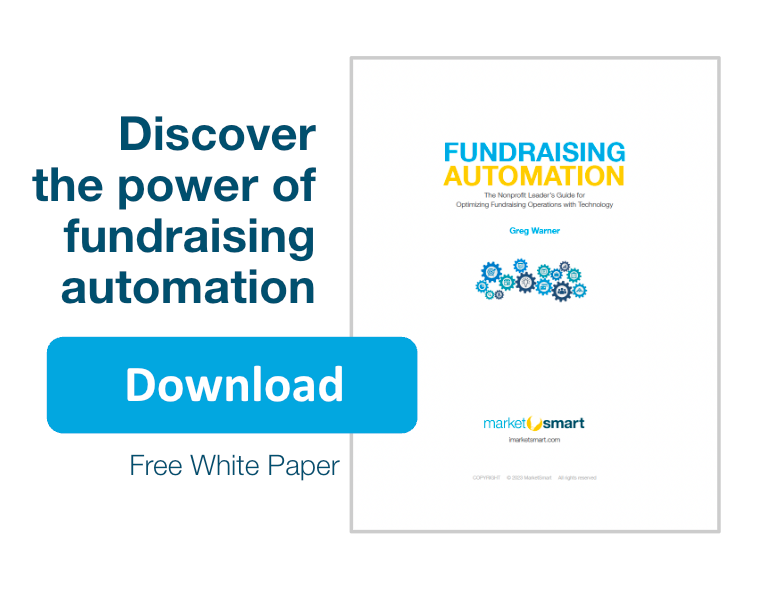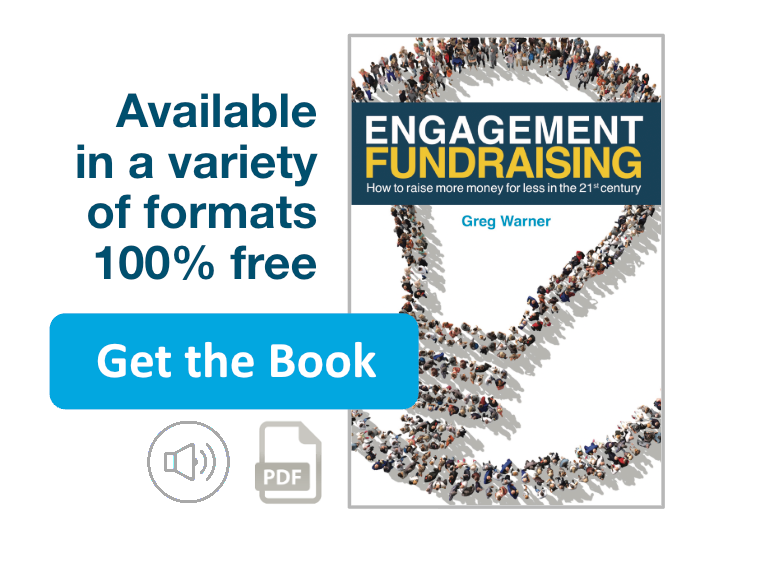Hiring major gifts officers is hard.
First, it’s just not an easy position to fill because there is a lot of turnover. But more than that, anyone involved in hiring a new teammate has to have a clear grasp of what separates the great from the good, and the good from the mediocre?
This goes beyond things like work ethic, commitment, technical understanding, and all the stuff they may have learned in college. After all, when it comes to doing what’s really needed to secure a major gift (including scheduling meetings, engaging with new leads, qualifying and nurturing those leads, and building relationships) a college degree won’t separate top performers.
What you really need to know is:
Can they take the position of counselor and guide when they’re meeting a major donor prospect?
Can they sustain momentum when it’s just them and the potential donor?
Can they even get in the room to meet with a prospect in the first place?
If you’ve been finding it harder to hire truly effective major gift officers, it might be because you’ve been looking for the wrong traits.
Start by looking for curious chameleons.
According to one study, a small number of major gift staff have 78% higher odds of exceeding their fundraising goals. They are curious chameleons.
These high performers have a thirst for learning, can change their speaking style and behavior depending on with whom they are meeting, can distill information to determine what’s truly relevant, and are able to conduct themselves in a confident manner.
What to look for when hiring a major gift officer:
The following seven traits of highly effective gift officers might help you get better at sifting out the best candidates.
Then, when you find a major gifts officer candidate who has these seven traits, hire them immediately and treat them right so they don’t turnover!
1. High Emotional Intelligence
Emotional intelligence is often referred to as EQ, and when it comes to major gifts officers, EQ matters much more than IQ. It’s not that technical skills, analytical reasoning, and knowledge don’t matter. It’s just that those things are, frankly, easier to find.
Some experts believe you can teach EQ, while others think it’s an innate quality some are born with. Either way, you need to be able to spot it during your interviews and hiring process.
The value of EQ isn’t only high for gift officers. It’s high for just about every industry. For most companies, there are plenty of job candidates who possess the requisite skills and abilities to do the job.
But if those candidates are a pain to work with, treat people badly, or are easily frustrated or intimidated, do you really want to hire them? And for our topic today, do you really want those people working with your major donors?
Uh… no.
Emotional intelligence has to do with perceiving and understanding the emotions of other people, in addition to yourself. It’s like having antennae.
For fundraisers working with major donors, you need gift officers who can detect the emotions of the supporters and donors they’re meeting with – while they’re meeting with them.
The best gift officers can detect anxiety, compassion, nervousness, empathy, and many other emotions that their prospects may be feeling. In addition to that, they know how to respond appropriately. The last thing you want is a gift officer who minimizes, dismisses, or at worst, just outright ignores the emotions of their donors.
Have you ever felt that way? You share something personal and vulnerable with someone, and they act as if they didn’t even hear it? I like to do this sometimes when salesmen are pitching to me, just to see how they’ll react. For some, it hits them so awkwardly, and they fumble around trying to regroup and find their way back to their pitch again.
They aren’t listening. They can’t adapt their plan based on what’s happening right in front of them.
You don’t want that person to be your gift officer.
Not sure how to determine if someone has EQ? Here’s a list of 17 emotional intelligence tests you might want to consider.
2. Ability to Read People
This is related to EQ in some ways. A gift officer needs to be able to read the room. Is it tense? Is it relaxed? Does it feel like the person they’re speaking with just came from a frustrating meeting or is having a hard day?
The best major gifts officers excel at this skill, and they might test the waters with questions like, “Is this a bad time?” or, “How are things going for you today?”
That question is a little more sincere than the perfunctory “How ya doing?” that most people ask but don’t really expect an answer.
A gift officer who can read people will also know how to steer the conversation based on the other person’s vibes. They can tell if the other person is tensing up, for example, and that now isn’t the best time to make the ask. They can tell if a person wants to share something, even though it may not be related to the question the gift officer just asked.
Reading people well is so important because it allows the prospect to feel heard, valued, and understood. A person who reads people is a person who makes others feel comfortable around them. More trustworthy.
A good interviewer has this same skill, and hopefully your nonprofit has at least one person involved in your hiring process who can read people well, because that person will be able to tell if the gift officer candidates you’re interviewing have this ability too.
3. Great Memory for Faces, Names, Personal Details
It’s hard to teach this one too. Some people just have a knack for it. But it is so valuable for a major gift officer, because they interact with dozens or even hundreds of people every year in various settings.
The ones who can remember key details, names, and faces, without having to go look everything up, have such an advantage over the ones who can’t.
They come across as warmer, more friendly, and as if they actually care about the other person. They seem more like a friend and confidant, rather than a representative from a nonprofit.
4. A Tendency to Engage with People Outside Their Job
Gift officers who love to engage with people, whether in the workplace or outside it, have proven to be more effective gift officers. In other words, they might participate in the community choir or coach their kid’s soccer team.
This doesn’t mean they necessarily need to be extroverts. In fact, ambiverts are better than extroverts and introverts when it comes to success in major gifts fundraising (and commercial sales).
What you’re really looking for is an ability to get along with others. Ask yourself, “Is this person likable?” Major gifts fundraising is about relationships. Relationships depend on trust, authenticity, and communication. The gift officers who are just naturally interested in people don’t have to work at being likable. It’s like breathing to them. They do it naturally so they have one less hurdle they need to overcome to connect with prospects and do their jobs well.
5. A Love of Reading, Especially Popular Psychology Books
If you’re looking for actual interview questions to ask a prospective major gifts officer, here’s one:
“What’s the last psychology-related book you read and enjoyed?”
If they have an answer – any answer at all – that’s a good sign, because it means they actually like this stuff. They like understanding people. They are naturally interested in it, enough to buy and read books on the subject, just for fun.
And just to be clear – the five traits of highly effective major gifts officers you’ve just read about aren’t merely our ideas. They come from a three-year research project led by Dr. Beth Breeze in which she found that the most successful fundraisers possess these five specific qualities.
Find a way to tease these out in your interview process. All five of them. And we’ve got two more of our own to add to the list in a bit. But first:
The Defining Question of the Best Major Gifts Officers
You can sum up all five of the previous traits in one question. This question defines the perspective of the most effective major gifts officers:
“What would a good friend do?”
Should I write a follow-up postcard? Should I send them ten reminder emails about our meeting in the next two days? Should I call them at 10pm because they didn’t return my calls during normal business hours? Should I visit them in person or try to do everything through zoom?
What would a good friend do?
The best gift officers think of themselves and act as if they are good friends with the major donor prospects in their caseloads.
Find a way to put that in your hiring process.
6. Patience
Are we done yet?
Not if you want to learn how to identify the very best major gift officers. For them, patience is an essential trait. They know that if they ask for money too quickly, less will be donated.
Meaningful philanthropic giving is not transactional. It’s relational.
And relationships take time to grow. That’s why metrics from on high, coming down from boards and administrators demanding a certain number of gifts every month or every year, aren’t grounded in wisdom.
Transformational giving happens relationally. And relationships require patience. Two to three years is fairly typical before a major gift is given.
Donor qualification and cultivation is where the real money is made.
And this is one way fundraising automation can make such a profound impact on your major gifts and planned giving fundraising. Automation such as MarketSmart can help qualify and cultivate donors without requiring the gift officer to devote so much time to these essential steps in the process.
In fact, it’s possible to take almost all the qualification and cultivation steps out of the hands of the gift officer, and only introduce that person when the donor is prepared to talk about making a transformational gift.
Want to see how?
Sign up for a free demo of MarketSmart’s fundraising automation software.
7. Sincerity
You want donors to give. Of course. But the very best gift officers also want to build sincere, genuine relationships with these people.
This is about more than money. The best gift officers really do care about the donor having the best possible giving experience. They want that donor to be overjoyed at their decision to give. They want to share with that joy when the donor sees what their gift has achieved. And they have no ego in the matter. It’s about the donor, not them.
For gift officers like these, this is more than a job. It’s a calling. They don’t have to pretend to care about a donor’s life. They really do care. For gift officers like this, empathy comes naturally. You don’t need to train them on why empathy is important. It’s part of their DNA.
Find a way to tease out the sincerity of your gift officer candidates and how they feel about prospects. An experienced gift officer should have friendships from previous nonprofits that are still thriving today, even if the professional relationship is over.
How Fundraising Automation Simplifies Major Giving
You can sign up for a demo if you want to see how MarketSmart’s software makes it possible to automate the most tedious but essential data-gathering steps of the qualification and cultivation processes.
But if you’d like to learn a little more first, read this free whitepaper about Fundraising Automation, and discover how technology makes it possible to optimize your major gifts and planned giving fundraising operations.
Related Resources:
- Build Relationships: The Foundation of Fundraising
- What makes a great Gift Officer great? 5 traits
- Do you really need MORE gift officers to raise more money?





I love this! Very helpful info.